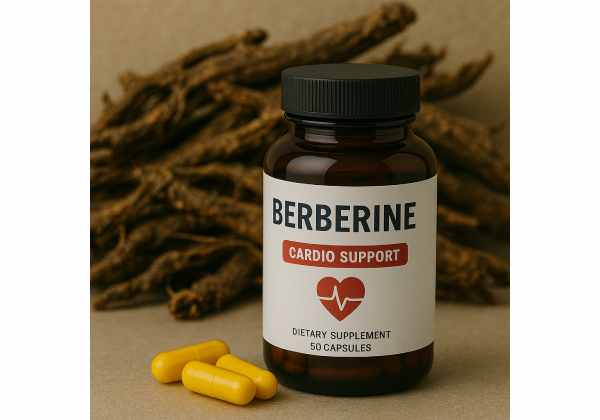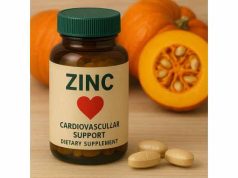
Berberine, a naturally occurring alkaloid found in several medicinal plants, has gained prominence as a multi-targeted supplement for promoting cardiovascular well-being. This potent compound, primarily sourced from botanicals like Berberis aristata and Coptis chinensis, has been studied for its ability to stabilize blood lipids, aid in blood sugar management, and reduce systemic inflammation—factors that converge to bolster heart function. Increasingly, both researchers and health practitioners recognize berberine for Heart Health as a notable ally in preventing or mitigating various cardiac and vascular complications. Discover how this versatile supplement can integrate into your holistic regimen to promote a resilient cardiovascular system.
Table of Contents
- Profile, Background, and Botanical Origins
- Mechanisms: How Does Berberine Work?
- Cardioprotective Advantages and Scientific Evidence
- Dosage Guidelines, Usage Considerations, and Safety
- Common Queries: Berberine FAQ
- References and Scholarly Publications
Profile, Background, and Botanical Origins
Berberine is a bioactive compound extracted from the roots, rhizomes, and bark of diverse plant species within the Berberidaceae family, such as Berberis, Coptis, and Hydrastis. This bright yellow alkaloid has been a cornerstone in Ayurvedic and Traditional Chinese Medicine for centuries. Long prized for its antimicrobial and anti-inflammatory qualities, berberine has also played a therapeutic role in metabolic imbalances, gastrointestinal concerns, and overall vitality. Today, it is widely available in supplement form, championed for its notable impact on cardiovascular and metabolic health.
Traditional Uses and Global Adoption
Historically, traditional healers employed berberine-containing plants to treat infections, diarrhea, and other inflammatory conditions. Over time, its reputation expanded to incorporate more systemic disorders, thanks to mounting anecdotal evidence of improvements in energy, cardiovascular function, and blood sugar regulation. Modern consumers worldwide now embrace berberine for Cardiovascular Health, propelled by an ever-growing body of clinical and experimental data.
Primary Sources of Berberine
- Berberis (Barberry) Species: Varieties like Berberis aristata and Berberis vulgaris are native to Asia and Europe, respectively, and are common commercial sources of berberine.
- Coptis chinensis (Huang Lian): Extensively utilized in Traditional Chinese Medicine, this plant’s rhizomes boast high berberine concentrations.
- Goldenseal (Hydrastis canadensis): Native to North America, goldenseal also contains berberine, though its supply can be limited due to sustainability concerns.
Key Active Components
While berberine is often singled out for its robust biochemical effects, plants like barberry or goldenseal also contain secondary alkaloids—such as jatrorrhizine and palmatine—that may act synergistically. Nonetheless, berberine remains the primary driver of these plants’ therapeutic outcomes, exhibiting a broad range of pharmacological activities relevant to heart and metabolic regulation.
Market Forms and Preparation
Today’s berberine supplements come in capsules, tablets, or powders, typically standardized to contain a specific percentage (often 97% or higher) of pure berberine. Some products blend berberine with complementary extracts like milk thistle or cinnamon bark to potentially enhance bioavailability and broaden therapeutic scope. Regardless of format, the extraction and processing methods aim to preserve berberine’s chemical integrity and ensure consistent dosing for clinical effectiveness.
Growing Interest in Heart Applications
The impetus behind berberine’s rising popularity for Vascular Support hinges on validated actions such as inhibiting harmful cholesterol synthesis, curbing inflammation, and aiding glucose control. These processes significantly intersect with common cardiovascular issues like atherosclerosis, hypertension, and arrhythmias. In pursuing natural, side-effect-conscious alternatives or adjuncts to conventional pharmaceuticals, many practitioners and patients see berberine as a strategic fit.
In the following section, we explore the biochemical underpinnings that grant berberine its multifaceted abilities to modulate metabolic markers, reduce oxidative stress, and shore up cardiac resilience.
Mechanisms: How Does Berberine Work?
Berberine exerts a remarkable influence on multiple cellular signaling pathways, weaving together anti-inflammatory, antioxidant, and metabolic regulatory effects in ways that profoundly impact heart health. Though the full spectrum of its action is still under investigation, researchers have pinpointed several key mechanisms that illustrate why berberine Helps Cardiovascular Function and fosters overall physiologic balance.
AMPK Activation and Metabolic Regulation
One of berberine’s hallmark actions is the activation of AMP-activated protein kinase (AMPK), an enzyme often described as a “master regulator” of energy homeostasis. By stimulating AMPK:
- Enhanced Glucose Uptake: Tissues become more efficient at absorbing glucose, promoting stable blood sugar levels.
- Reduced Hepatic Gluconeogenesis: The liver scales back overproduction of glucose, helping curb hyperglycemia—a condition often tied to heart disease.
- Improved Lipid Profiles: AMPK activation can inhibit fatty acid synthesis, leading to lowered triglycerides and LDL cholesterol.
Anti-inflammatory Pathways
Chronic inflammation catalyzes many vascular injuries and atherosclerotic processes. Berberine’s anti-inflammatory effects include:
- Cytokine Inhibition: Suppression of pro-inflammatory mediators such as TNF-α, IL-6, and IL-1β.
- Regulation of NF-κB: By hampering the nuclear factor-kappa B (NF-κB) pathway, berberine reduces the expression of genes fueling inflammation and oxidative stress in endothelial cells.
Oxidative Stress Defense
Berberine contributes to vascular protection by reducing reactive oxygen species (ROS) production:
- Enhanced Antioxidant Enzymes: Certain studies indicate that berberine fosters increased activity of enzymes like superoxide dismutase (SOD) and catalase.
- Inhibition of LDL Oxidation: Oxidized LDL plays a pivotal role in arterial plaque formation. Berberine’s antioxidant attributes may help guard LDL from oxidative changes, slowing atheroma development.
Modulation of Lipid Metabolism
Berberine for Heart Health is lauded for its influence on cholesterol and lipid profiles:
- Downregulating PCSK9: Emerging research suggests berberine can suppress PCSK9, a protein that degrades LDL receptors, thus allowing more LDL clearance from the bloodstream.
- Inhibition of Cholesterol Uptake: Berberine may obstruct cholesterol absorption in the gut while boosting excretion via bile, leading to moderate cholesterol reductions.
Blood Pressure and Vasomotor Tone
Hypertension remains a major determinant of cardiovascular risk. Although berberine is not a standardized hypertension medication, evidence suggests:
- Vasodilation: By reining in oxidative stress and stabilizing endothelial function, berberine supports nitric oxide (NO) availability, thereby promoting vasodilation.
- Sympathetic Nervous System Influence: It may help downshift excessive sympathetic activity that drives high blood pressure and stress on arterial walls.
Cardiac Muscle Support
In addition to its systemic metabolic benefits, berberine also appears to interact with heart tissue directly:
- Positive Inotropic Effect: Early data from preclinical research indicate berberine can enhance the strength of cardiac muscle contraction, a possible boon for individuals with certain heart failure symptoms.
- Arrhythmia Prevention: By mitigating stress-related injuries and stabilizing ion channels, berberine might reduce the risk of certain types of irregular heartbeats.
Microbiome Interaction
Interestingly, some scientists propose that berberine’s metabolic improvements partially arise through modifications to gut flora. The rebalancing of beneficial gut bacteria could have ripple effects on inflammation, lipid metabolism, and immune responses, all central to cardiovascular well-being.
Collectively, these multi-pronged actions underscore how berberine fosters synergy among metabolic, inflammatory, and antioxidant pathways. Such integrative effects uniquely position it as a formidable candidate in both preventative and complementary cardiac care strategies. The subsequent section examines empirical data and clinical findings, highlighting how berberine’s mechanistic underpinnings translate into tangible cardiovascular gains.
Cardioprotective Advantages and Scientific Evidence
Over the past decade, a surge in scientific inquiry has illuminated how berberine can mitigate cardiovascular risk factors and support heart function. Clinical trials, animal studies, and observational reports collectively paint a compelling portrait of berberine Benefits for Heart Health. Below is a breakdown of key findings and their practical implications.
Cholesterol and Lipid Regulation
- LDL and Total Cholesterol: Multiple human trials reveal berberine’s ability to reduce LDL levels by 10–20% in participants with hyperlipidemia or metabolic syndrome. Participants also frequently report slight declines in total cholesterol and triglycerides.
- HDL Improvements: Some studies note modest elevations in HDL (“good”) cholesterol, bolstering overall lipid ratios that protect against atherosclerosis.
Blood Pressure and Vascular Adaptation
- Mild to Moderate Hypertension: Though more research is needed, initial findings point to berberine’s potential in slightly lowering blood pressure over consistent usage. The effect may be more pronounced when combined with diet adjustments or other antihypertensive supplements.
- Reduced Arterial Stiffness: By enhancing endothelial function and diminishing inflammatory stress, berberine helps preserve arterial elasticity, lowering strain on the heart.
Glycemic Control and Insulin Sensitivity
The link between stable blood glucose and cardiovascular status is well-established. Berberine’s metabolic modulation fosters:
- Reduced Fasting Glucose: Studies frequently compare berberine’s glucose-lowering impact to that of standard oral hypoglycemics.
- Improved HOMA-IR Scores: Markers of insulin resistance decrease, easing the burden on the pancreas and curbing a key driver of systemic inflammation and vascular damage.
Anti-arrhythmic and Myocardial Protection
- Arrhythmia Risk: Findings from certain animal and cell-based models imply that berberine can stabilize cardiac electrical activity, potentially averting abnormal rhythm events triggered by oxidative and metabolic stress.
- Heart Failure Management: In preliminary trials, participants with specific heart failure parameters who supplemented with berberine showed improvements in exercise capacity and ejection fraction, signifying enhanced cardiac output.
Inflammatory Marker Reduction
- CRP and IL-6: Patients in various studies observed noteworthy drops in C-reactive protein (CRP) and interleukin-6, biomarkers associated with vascular inflammation and future cardiac events.
- Synergy with Statin Therapy: Some evidence indicates that combining berberine with statins can intensify anti-inflammatory results, paving a path toward lower medication doses and reduced side effects.
Weight Management and Metabolic Syndrome
- Modest Weight Loss: Although not a primary weight-loss supplement, berberine’s effect on glucose and lipid metabolism often yields modest yet clinically significant reductions in body mass, further alleviating cardiac risks.
- Reduced Belly Fat: Central adiposity strongly correlates with heart disease. Reports suggest that better insulin sensitivity and fat oxidation under berberine support might help shift body composition over time.
Specific Clinical Trials and Meta-analyses
- Berberine vs. Metformin: In a landmark trial, berberine matched metformin in lowering blood glucose among type 2 diabetics while also showing added lipid-lowering benefits. These metabolic effects, indirectly supportive of heart health, placed berberine on the map as a multifaceted supplement.
- Lipid-focused Investigations: Meta-analyses combining smaller hyperlipidemic studies concluded that berberine consistently led to favorable shifts in LDL and total cholesterol when used for at least 8–12 weeks.
- Combination Therapies: Trials pairing berberine with conventional drugs (statins, beta-blockers, or ACE inhibitors) demonstrate potentially enhanced outcomes on inflammation, lipid management, and patient-reported energy levels.
While these findings validate berberine’s broad cardiovascular advantages, it is crucial to remember that bio-individuality matters—doses, treatment durations, and concomitant lifestyle choices can all impact observed results. The next section outlines how to navigate these variables to ensure that berberine usage remains both efficacious and secure in daily practice.
Dosage Guidelines, Usage Considerations, and Safety
Though robust and widely studied, berberine demands strategic use to fully capitalize on its cardiovascular benefits while minimizing adverse outcomes. Determining an effective dosage, timing regimen, and synergy with other therapies all play a part in ensuring a safe and productive user experience.
Common Dosage Ranges
- Mild to Moderate Cardiovascular Support: Many clinical studies employ doses of 500 mg taken two or three times per day (totaling 1,000–1,500 mg/day).
- Metabolic Syndrome or Elevated Lipids: Some trials extend up to 2,000 mg/day. However, higher dosages may result in increased side effects, emphasizing the need for gradual titration.
Timing and Administration Tips
- Divided Doses: Splitting the daily amount into two or three administrations can maintain consistent plasma levels, crucial for stable glucose and lipid regulation.
- Food Pairing: Taking berberine with or shortly after meals supports better gastrointestinal tolerance and may further assist glycemic control.
- Length of Use: Notable improvements in cholesterol, blood pressure, or inflammation typically emerge after 8–12 weeks of sustained intake. Evaluate progress periodically to gauge dosage adjustments.
Potential Side Effects
While generally regarded as safe, berberine can cause mild to moderate side effects in certain users:
- Gastrointestinal Distress: Gas, diarrhea, constipation, or stomach upset can arise, especially at higher doses. Lowering the dose or altering the schedule may help.
- Nausea or Reduced Appetite: A small subset of individuals experiences appetite suppression or mild nausea, often subsiding over time.
- Rare Allergic Reactions: Watch for symptoms such as rash or itching; discontinue if these occur and seek medical advice.
Drug Interactions and Precautions
Berberine has the potential to interact with various medications, including:
- Antidiabetic Drugs: Because berberine can lower blood glucose, combining it with prescription antihyperglycemics demands careful monitoring to prevent hypoglycemia.
- Cytochrome P450 Pathway: Berberine may inhibit certain CYP enzymes, affecting the metabolism of drugs like warfarin, statins, or immunosuppressants.
- Blood Pressure Medications: If used alongside antihypertensives, berberine could potentiate blood pressure reductions, warranting cautious dose management.
Vulnerable Populations
- Pregnant or Breastfeeding Women: Limited data exist on berberine’s safety during pregnancy or lactation. Prior consultation with a healthcare provider is prudent.
- Children: Pediatric usage remains understudied. Professional supervision is recommended for minors.
- Chronic Conditions: Patients with serious hepatic or renal ailments should seek specialized guidance to avoid complications or unexpected drug interactions.
Quality Assurance
Selecting a reputable berberine supplement is vital:
- Standardized Extracts: Aim for products specifying a high percentage of berberine or a precise mg amount per serving, ensuring consistency.
- Third-Party Testing: Labels indicating independent laboratory verification lend reliability concerning purity and potency.
- Respected Brands: Manufacturers adhering to Good Manufacturing Practices (GMP) signals trustworthiness in ingredient sourcing and manufacturing procedures.
Integrative Considerations
Finally, remember that berberine excels when woven into a broader heart-health strategy that includes:
- Balanced Diet: Particularly one focusing on complex carbohydrates, lean proteins, healthy fats, and ample vegetables.
- Regular Physical Activity: Exercise fortifies cardiovascular function and complements berberine’s metabolic benefits.
- Lifestyle Factors: Stress management, quality sleep, and moderated alcohol use each amplify or undercut berberine’s positive impact.
When followed with diligence, these guidelines maximize the potential for berberine to serve as a potent, holistic agent in heart-centric care. The next section provides clear and concise answers to frequently asked questions about berberine’s uses, safety, and synergy with other health tactics.
Common Queries: Berberine FAQ
How does berberine improve cardiovascular health?
Berberine primarily supports heart health by regulating blood lipids, enhancing insulin sensitivity, and reducing inflammation. These effects help maintain healthier blood pressure, protect arterial walls, and prevent plaque buildup, thus promoting overall cardiovascular resilience.
Can berberine be combined with other heart supplements?
Yes. Many people pair berberine with omega-3 fatty acids, garlic extracts, or CoQ10 for amplified cardiovascular benefits. However, always seek medical advice if you’re on prescription medications, as berberine can affect drug metabolism.
When can I expect to see results from berberine supplementation?
Research typically shows noticeable changes in cholesterol, blood sugar, and inflammatory markers after 8–12 weeks of consistent berberine usage. Individual responses can vary based on dosage, diet, exercise, and overall health status.
Is it safe to take high doses of berberine for faster outcomes?
Higher dosages do not necessarily equate to better results and can increase the likelihood of side effects like GI discomfort. Follow recommended guidelines or consult a healthcare professional to tailor a suitable dose for your needs.
Can berberine replace prescribed heart or diabetes medications?
No. While berberine may complement existing treatments, it isn’t a stand-in for prescription drugs. Always discuss any supplement changes with your healthcare provider to avoid interactions or missed opportunities for professional care.
References and Scholarly Publications
- Peer-Reviewed Journals
- Phytomedicine and the Journal of Ethnopharmacology provide extensive coverage of berberine’s cardioprotective and metabolic data.
- Biochimica et Biophysica Acta (BBA) – Reviews on various aspects of berberine’s molecular mechanisms.
- Clinical Trial Databases
- PubMed: Hosts numerous studies, including randomized controlled trials examining berberine’s impact on lipid profiles, blood pressure, and glycemic control.
- ClinicalTrials.gov: Indexes ongoing or completed human research projects focusing on berberine’s safety and efficacy for cardiovascular risk management.
- Professional Organizations and Institutions
- American Heart Association (AHA): While not specifically endorsing berberine, offers guidelines on integrative approaches and the role of alternative therapies in heart health.
- World Health Organization (WHO): Discusses global health implications of metabolic syndrome and how natural compounds like berberine may contribute to preventative strategies.
- Books and Comprehensive Reviews
- Monographs and review articles in academic texts compiling in-depth data on berberine’s chemical structure, pharmacodynamics, and potential synergy with standard cardiometabolic therapies.
Disclaimer:
This article is provided solely for educational purposes and is not intended as a replacement for professional medical advice. Always consult a qualified healthcare practitioner before introducing berberine or making changes to your existing treatment plan.
If you found value in this discussion, please share it on Facebook, X (formerly Twitter), or your favorite social platform. We invite you to follow us as well for more insights into natural supplements and strategies for a healthier cardiovascular system!






